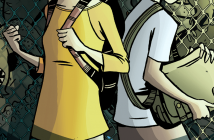 When I got sucked into , for me, one of the most appealing aspects of the show was fat character, Kate Pearson, played by Chrissy Metz. Not only was it wonderful to find a fat actress in a nuanced, well-written, leading role, but Kate’s storylines really resonated with me. They represented things I’ve experienced myself.
When I got sucked into , for me, one of the most appealing aspects of the show was fat character, Kate Pearson, played by Chrissy Metz. Not only was it wonderful to find a fat actress in a nuanced, well-written, leading role, but Kate’s storylines really resonated with me. They represented things I’ve experienced myself.
Kate has trouble stepping out of her brother’s shadow. Her body image issues have left her without the confidence to pursue her singing career and she has trouble accepting her boyfriend’s love and affection. As a fat woman, I felt all of this so much. And as a writer, I understood it too. This theme – that fatphobia can rob people of their agency and leave them feeling unworthy of their dreams – plays a major part in my own book.
Fat Girl on a Plane (coming June 5) follows teen fashion student, Cookie Vonn, who wants to be the next great designer. Because I wanted to highlight and discuss the difference between the way that fat people and thin people are treated by society, I wrote the book in two timelines. I show Cookie before and after a major weight loss she falsely believes will solve all her problems. The book was heavily inspired by my own personal experiences as a teenager.
One day I was at lunch with friend who is, like me, someone society would classify as fat. I had just finished the last episode of and I turned to my friend and said, “Don’t you just love Kate’s character?”
There was an awkward pause at the table and my excitement started to drain away.
“No. I don’t,” she said flatly.
I have to be honest. I was pretty shocked. I thought we – all the fat women – loved Kate. I thought we, all felt the same. I thought we all wanted the same things.
My friend reminded me that we don’t.
“Her entire character so far is just all about weight loss,” my friend said. “I’m just tired of that. It’s not the representation I want.”
For me, watching Kate Pearson reenact some of my real-life struggles – watching her encounter some of the same issues I’ve faced and move beyond them – was an incredible catharsis. For my friend, it was something she’d seen before and she wanted something else.
This year, 2018, must be setting some kind of a record for YA books that are body positive and have fat protagonists. Thus far this year, releases include Leah On The Offbeat by Becky Albertalli and The Summer of Jordi Perez by Amy Spalding. Later this summer, we’ll have Puddin’ by Julie Murphy (the companion to the marvelous Dumplin’), Undead Girl Gang by Lily Anderson and To Be Honest by Maggie Ann Martin. In the Fall, Jill Baguchinsky will give us her plus-size paleontologist in Mammoth.
If there is a downside to all of this, it’s that I sometimes see these books pitted against each other, often in the context of one book being the “right kind of representation” or the “right way to represent fat girls” and another is not. And when I see that kind of commentary, I think of the conversation that I had with my friend.
Fat people are not a monolith.
In the US, around 40% of the population is considered overweight. That’s millions of people who have different wants and needs and feelings and ideas.
The “right” way to represent us is in a way that is free from stereotypes, bigotry and in a manner that is appropriately sensitive. But beyond that, in culture, I think we need to have all kinds of fat representation. On the page and on the screen, we need fat people of all races, of all gender identities, of all sexualities and of all income levels. And we need to be free to show different kinds of characters who have a variety of feelings about their bodies.
When I actually was a teenager, there were very few books that represented me. Few books where I could go to see myself. Most of the books that tackled fat did so in the vein of showing a slightly larger than average character who felt fat. If I could build a time machine and take my teen self a stack of today’s body positive books, I would certainly have The Summer of Jordi Perez near the top. Amy Spalding did a masterful job in creating Abby Ives, the plus-size fashion blogger who learns to love herself exactly as she is while have the summer of her life in L.A. Spalding’s book is full of fun and full of heart.
There were times in my teen life when I really really needed a book like that.
But there were times when I needed a book like mine as well. There were times when I needed Leah On The Offbeat and times when I needed Puddin’.
Because what I needed most of all was the feeling that people like me were people.
And people are individuals with all kinds of different dreams and destinies.
I don’t think that there is one “right” fat heroine for all of us but I’m thrilled that, in 2018, we’re getting so many great fat characters to choose from.




